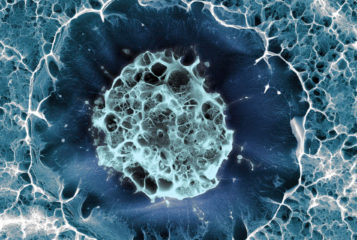The scientist who cloned Dolly the sheep has been given permission to use the same technique to clone human embryos for medical research into stem cells. The Human Fertilisation and Embryology Authority (HFEA) has granted a licence to the Roslin Institute in Edinburgh to use the CNR (cell nucleus replacement) technique to produce stem cells to be used in the study of motor neurone disease (MND). The Roslin licence is only the second to be issued by the HFEA to allow scientists to clone human embryos for research since cloning was formally legalised in 2001. Scientists at the University of Newcastle were awarded the first licence, in August 2004.
Professor Ian Wilmut, alongside colleagues from King's College London (KCL) will use the CNR technique he pioneered to create cloned embryos from skin cells taken from patients with MND - in particular those patients whose condition cannot be linked to genes already known to cause the disease. His aim is to produce embryonic stem cell (ES cell) - the body's 'master cells' - which can be directed to develop into any one of the many specialised tissue cells of the body. These cell lines can then be studied in the laboratory for signs of the debilitating neurodegenerative disease.
Professor Christopher Shaw, a neuroscientist at KCL, and a collaborator on the project, said the hope was to grow nerve cells with the symptoms of MND. He said that by turning ES cells from motor neuron patients into nerve cells, scientists would have an opportunity to understand the illness and how to treat it with new drugs.
Professor Wilmut clarified that the embryos would not be allowed to live beyond the legal limit of 14 days before being destroyed, and that there was no intention of allowing cloned babies to be born, which is illegal in Britain. 'This is not reproductive cloning in any way', he said. Angela McNab, Chief Executive of the HFEA, said that the licence had been granted 'under strictly defined guidelines outlined in the Human Fertilisation and Embryology Act 1990'. She added: 'We recognise that MND is a serious congenital condition. Following careful review of the medical, scientific, legal and ethical aspects of this application, we felt it was appropriate to grant the Roslin Institute a one-year licence for research into the disease'. Brian Dickie, director of research at the Motor Neurone Disease Association, welcomed the HFEA's decision, saying that 'we are a step closer to medical research that has the potential to revolutionise the future treatment of motor neurone disease'.
Meanwhile, the Scotsman newspaper has reported that a legal challenge to the Newcastle cloning licence is to go ahead. Peng Voong, policy analyst for the Lawyers Christian Fellowship, who brought the action in November last year, says that the HFEA acted unlawfully in granting the licence and that the information it gave was 'incomplete, misleading and extremely worrying'.
Sources and References
-
HFEA grants embryonic stem cell research licence to study motor neuron disease
-
Dolly expert is to clone embryos
-
Dolly scientist wins human cloning research licence
-
Dolly the sheep scientist licensed to clone embryos






Leave a Reply
You must be logged in to post a comment.